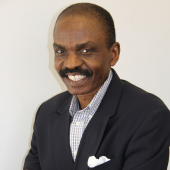Author: [AUTHOR] Published on 7/1/2025 12:00:00 AM
Ene I. Ette, PhD, President, Anoixus Corporation, Natick, Massachusetts
What does being the 2025 Sheiner-Beal Pharmacometrics Award Recipient mean to you?
Being named the 2025 Sheiner-Beal Pharmacometrics Award recipient is an extraordinary honor with deep personal and professional significance. This award represents not just a recognition of individual contributions to the field of pharmacometrics but also a validation of the collective impact of innovation, collaboration, and dedication to advancing healthcare.
On a personal level, this accolade serves as a milestone in a journey defined by resilience, determination, and a commitment to empowering patients through evidence-based decision-making. It underscores the importance of bridging the gap between science and practice—ensuring that pharmacometrics drives real-world benefits for diverse populations, particularly those underserved in healthcare.
Professionally, recognition reinforces the value of fostering interdisciplinary collaborations, promoting diversity in clinical research, and leveraging data to improve patient outcomes. It is a moment to reflect on the progress we have made in making clinical research more accessible and inclusive while acknowledging the work that still lies ahead.
Ultimately, receiving this award is a reminder of the power of perseverance and the importance of aligning purpose with action. It inspires me to continue advocating for equitable healthcare and advancing innovative solutions that empower individuals to take an active role in their health journey.
What professional accomplishment are you most proud of?
I thought about how we changed the duration of hepatitis C from 48 weeks with intron-based therapy to 24 weeks with telaprevir, thereby changing the hepatitis drug development and pharmacotherapy landscape and paving the way for a shorter duration of treatment today. Although it was a significant accomplishment, its impact is limited to hepatitis C drug development and pharmacotherapy.
The professional accomplishment that I am MOST proud of is the 1999 US Food and Drug Administration Guidance for Industry: Population Pharmacokinetics, which was only revised in 2019. The guidance, which contained most of my research at the time on the design and analysis of population pharmacokinetic studies, has changed how drugs are developed worldwide. It has led to data-driven drug development decision-making, and it is the basis for model-informed drug development and precision medicine.
What is the most important leadership lesson that you have learned the hard way?
I cannot recall a leadership lesson that I learned the hard way – rather I will share some thoughts on successful leadership. Success as a leader is about the intersection of technical expertise and empowering others to excel and grow. As the head of an organization and previously a department head, I have learned that employees cannot reach their full potential without the provision of the necessary trust and learning environment. They need the room to make mistakes while learning, knowing that I am there for them and investing in their professional growth and development. Authentic leadership lies in inspiring others, creating a shared vision, and recognizing that the collective strength of a team often determines success. My career journey is underscored by the transformative power of humility, collaboration, and a commitment to leave a lasting legacy in Pharmacometrics and Clinical Pharmacology.
What has been the greatest challenge in your career?
The greatest challenge has been maintaining a work/life balance. For me, my family comes first. Therefore, I always make it my priority to be there for my family. My family is my greatest asset in life.
Do you have a favorite tip or trick for clinical practice that you want to share with fellow members?
There are no shortcuts to excellence, but hard work and reading widely is a good start. Open paths for others to tread instead of taking well-worn paths that everyone knows where they lead.
In research or practice, there are some key questions you need to ask, and having answers to them will make all the difference. They are:
- What problem are you trying to solve?
- Do you have the necessary data to address the question, or do you need to generate the data?
- How do you know what you want to know, and what assumptions are you willing to make?
- How certain do you want to be, and do the results address the question you set out to answer?
My favorite memory of the Society was when Dr. Lewis Sheiner complimented me on my paper, “Stability and Performance of a Population Pharmacokinetic Model”, at the ASCPT 1996 Annual Meeting.
Dr. Ette has been a member of ASCPT since 2008.
